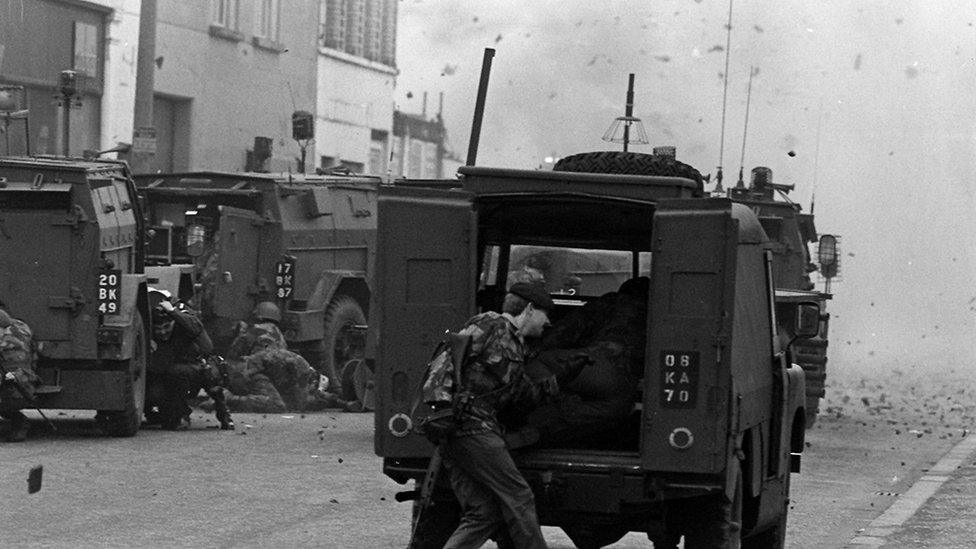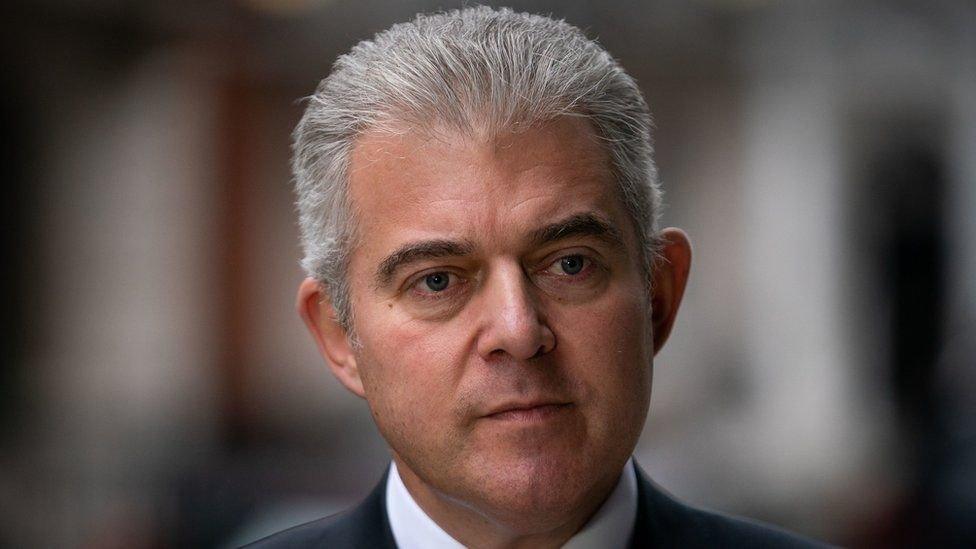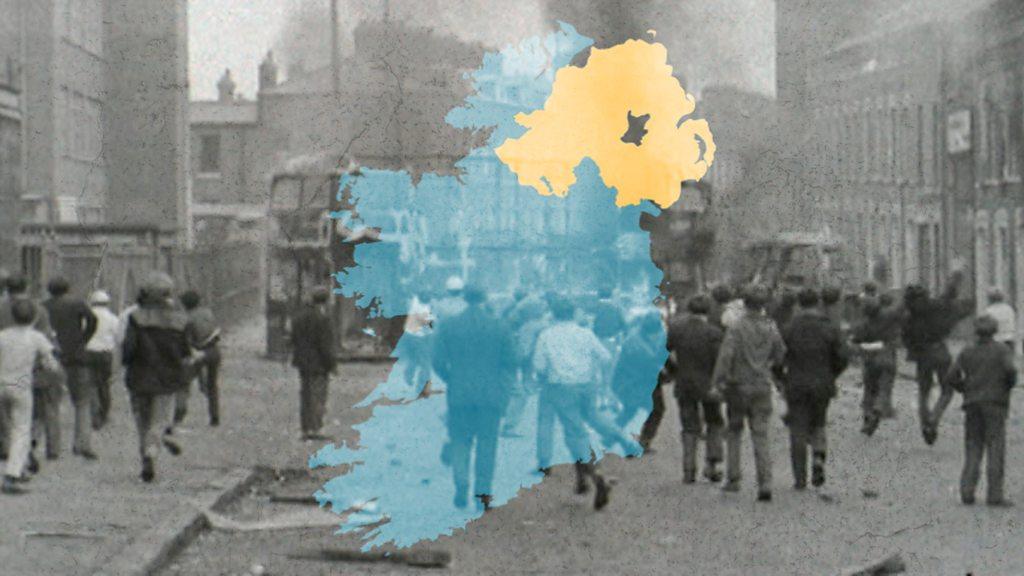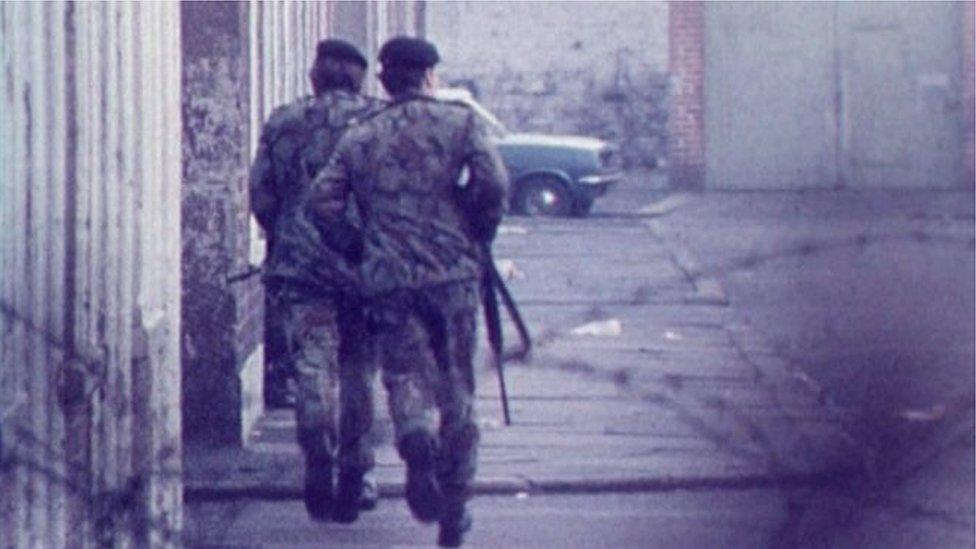NI Troubles: Legacy bill passes Commons stages
- Published

Controversial legislation aimed at ending Troubles legacy prosecutions has passed its stages in the House of Commons, despite ongoing political opposition.
The bill offers a conditional amnesty to those accused of killings and other Troubles-related crimes.
It will proceed to the House of Lords in the autumn to face further scrutiny.
No MPs from Northern Ireland support the bill.
Northern Ireland Secretary Brandon Lewis said the bill would "help families and victims move forward".
The Conservative Party's working majority of 73 means it can comfortably pass the legislation without relying on other parties in parliament.
On Monday, it passed its third reading by 282 to 217 votes, with Labour, the DUP (Democratic Unionist Party), SDLP (Social Democratic and Labour Party), Alliance and other opposition parties at Westminster voting against it.
"Even though we've done our best to improve the bill, we can't support it as it stands today - it gives more rights to people who committed crimes than their victims," said shadow Northern Ireland Secretary Peter Kyle.
Attempts to amend the government bill further during its committee stage on Monday were also unsuccessful.
A move to prevent those securing immunity under the new scheme from profiting from their crimes was rejected by 282 votes to 209.
MPs voted by 282 to 211 to retain a measure in the bill that will ban all future inquests related to the Troubles.
While a DUP bid to reverse amnesties in cases where someone has given false evidence to the truth recovery panel was also rejected.

Brandon Lewis addressed the House of Commons on Monday
Northern Ireland Minister Conor Burns said the government was having "active conversations internally" to work with opposition parties to see if cross-party changes could be agreed to the legislation at a later date.
DUP, SDLP and Alliance MPs criticised the government during Monday's debate, arguing that the government had no intention of acting on their proposals.
"What are these two days of scrutiny for, if our scrutiny amounts to nothing?" DUP MP Gavin Robinson said.
SDLP leader Colum Eastwood said the government "could not be trusted" on legacy matters, while Alliance's Stephen Farry said there was an "unfairness" to the plan to close inquest cases.
Under the bill, immunity from prosecution will be offered to those who co-operate with Troubles investigations run by a new information recovery body.
The Independent Commission for Reconciliation and Information Recovery (ICRIR) will be headed by a judicial figure appointed by the government.
It would be operational for five years.
A panel within the ICRIR will be responsible for deciding if a perpetrator qualifies for immunity.
Once granted, it cannot be revoked.
It will still take months before the legislation makes it into law and takes effect.
The roots of Northern Ireland’s Troubles lie deep in Irish history
Groups representing victims and relatives have criticised the bill and accused the government of ignoring their concerns, while some veterans' organisations have welcomed the move.
'Serious questions'
The Council of Europe commissioner for human rights, Dunja Mijatović, said on Monday that the bill raises "serious questions about the extent to which the proposed mechanism to review Troubles-related cases is compliant with ECHR (European Convention on Human Rights) standards on independent and effective investigations".
"The possibility to grant immunity from prosecution on a low evidentiary bar raises concerns that this could lead to impunity," Ms Mijatović added.
The commissioner said the "virtually unanimous, cross-community rejection of the proposals also casts doubt over their potential to contribute to reconciliation in Northern Ireland".
Earlier, Paul Young of the Northern Ireland Veterans Movement, told BBC News NI he believed the legislation was the best way to move forward.
"We hope our voice has been quite strong within the government, because you are talking about 200,000 odd veterans on the mainland and some in Northern Ireland.
"Not all Northern Ireland groups are opposed to this, some of them are coming round to thinking this is possibly the only way forward, but at some time it's got to end.
"We can't keep going in year after year after year and finding ourselves in this same place, this country's got to move on."
In May, the government introduced legislation that aims to draw a line under the Northern Ireland Troubles by dealing with so-called legacy issues.
The Northern Ireland Troubles (Legacy and Reconciliation) Bill runs to almost 100 pages.
It is an attempt to deal with more than 1,000 unsolved killings.
In June, a bid to prevent immunity from prosecution being offered to those who cooperate with Troubles investigations was rejected in the Commons.
MPs voted to retain the measure within the government's legacy bill.
Related topics
- Published13 August 2019

- Published29 June 2022

- Published17 May 2022
